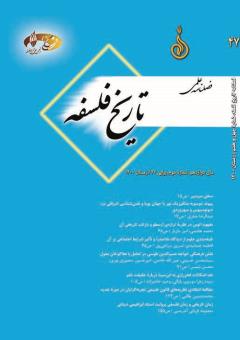نقد اشكالات فخررازي به ابنسينا دربارة حقيقت علم
محورهای موضوعی : ریشهشناسی واژگان (اتیمولوژی) فلسفی
سیده زهرا موسوی بایگی
1
![]() ,
وحید خادم زاده
2
*
,
وحید خادم زاده
2
*
1 - دانشجوي دكتري حكمت متعاليه، دانشگاه فردوسی مشهد، مشهد، ايران
2 - استاديار گروه فلسفه و كلام اسلامي، دانشگاه فردوسی مشهد، مشهد، ايران
کلید واژه: حقیقت علم, صورت, کیف, اضافه, ابنسینا, فخررازی,
چکیده مقاله :
فلاسفة مسلمان اگرچه بصورت خاص به مباحث معرفتشناسی نپرداختهاند اما در باب کلیات علم و معرفت، بتفصیل سخن گفتهاند. شیخالرئیس، در آثار متعدد خود، بمناسبتهای مختلف، تعابیر متفاوتی دربارة چیستی علم بیان كرده و گاهی علم را صرفاً کیف، گاهی کیف دارای اضافه و گاه صرفاً اضافه دانسته است. همچنین تعبیر علم به تجرد از ماده نیز در آثار او بچشم میخورد. این تعدد عبارات، برای افرادی همچون فخررازی، دستاويزي شده تا اندیشة شیخ را مورد نقد و جرح قرار دهند. فخررازی در مواضع متعدد از آثارش تأکید میکند كه ديدگاه ابنسینا در باب علم متشتت بوده و نتوانسته به دیدگاهي واحد دربارة حقیقت علم دست يابد. پژوهش حاضر که به روش تحلیلی ـ توصیفی و با رویکرد نقادانه نوشته شده، میکوشد پس از نقل ادعای فخررازی، صحت آن را ارزیابی نماید، سپس بسراغ آثار او رفته تا تعاریف علم نزد وی را بررسی نمايد. نتیجة بدستآمده از بررسیها نشان میدهد كه اگرچه برخی مشکلات مبنایی در دیدگاه شیخالرئیس وجود دارد، اما سخنان ابنسینا بر اساس مبانی او، مستحکم و قابل تحویل به دیدگاهی واحد است این درحالیست که رازی خود در مسئلة مذکور دچار دوگانهگویی شده است.
Although Muslim Philosophers have not specifically discussed epistemological problems, they have extensively spoken of some general issues regarding knowledge. Ibn Sīnā has provided various definitions and explanations in relation to the nature of knowledge on different occasions in many of his works. He has conceived of knowledge sometimes as pure quality, sometimes as quality possessing relation, and sometimes as pure relation. Moreover, he has interpreted knowledge as abstraction from matter in some of his works. Such a diversity of interpretations has given an excuse to some people such as Fakhr al-Dīn Rāzī to criticize and question Ibn Sīnā’s view of the truth of knowledge. In different places in his works, Fakhr al-Dīn Rāzī emphasizes that Ibn Sīnā’s view of knowledge was divided, and he failed to attain a single standpoint concerning the truth of knowledge. The present study, which was conducted following an analytic-descriptive method and a critical approach, firstly presents Fakhr al-Dīn Rāzī’s claim and, then, evaluates its truth. Next, the authors delve into his other works to examine the definitions of knowledge in his view. The findings of this study demonstrate that, although there are some fundamental problems in Ibn Sīnā’s view, his words are based on his own principles, are solid, and can be reduced to a unitary view. However, Rāzī’s words on this problem are inconsistent.
ابنسينا (1371) المباحثات، تحقيق محسن بيدارفر، قم: بيدار.
ابنسينا (1375) الاشارات و التنبيهات، قم: نشر البلاغه.
ابنسينا (1379) النجاة من الغرق فى بحر الضلالات، تصحيح محمدتقى دانشپژوه، تهران: دانشگاه تهران.
ابنسينا (1400ق) رسائل ابنسينا، قم: بيدار.
ابنسينا (1404ق/ الف) الشفاء( الالهيات)، تصحيح سعيد زايد، قم: كتابخانه آيتالله المرعشى.
ابنسينا (1404ق/ ب) الشفاء( الطبيعيات)، تحقيق سعيد زايد، قم: كتابخانه آيتالله المرعشى.
ابنسينا (1404ق/ ج) التعلیقات، تصحیح عبد الرحمن بدوی، قم: مکتب الإعلام الإسلامي.
ابنسينا (2007 م) احوال النفس، تحقيق فؤاد الاهوانى، پاريس: دار بيبليون.
ابنعربی، محیالدین (1446ق) فصوص الحكم، قاهره: دار إحياء الكتب العربية.
بهشتي، احمد (1386) ترجمه و شرح نمط هفتم اشارات، قم: بوستان كتاب.
جوادی آملی، عبدلله (1395) رحیق مختوم، قم: اسراء.
ذبيحي، محمد (1378) «دیدگاه ابنسينا و صدرالمتألهین درباره علم الهی»، پژوهشهای فلسفی ـ کلامی، شمارة 2، ص115 ـ 91.
رازی، فخرالدین محمد بن عمر (1373) شرح عيون الحكمة، تحقيق محمد حجازى و احمدعلى سقا، تهران: موسسة الصادق(ع).
رازی، فخرالدین (1384) شرح الاشارات و التنبيهات، تصحيح عليرضا نجفزاده، تهران: انجمن آثار و مفاخر فرهنگى.
رازی، فخرالدین (1407ق) المطالب العالية من العلم الإلهی، تحقيق سقا حجازى، بیروت: دار الكتاب العربي.
رازی، فخرالدین (1411ق) المباحث المشرقية فى علم الالهيات و الطبيعيات، قم: بیدار.
رازی، فخرالدین (1986م) لباب الاشارات و التنبيهات، تحقيق احمد حجازى السقا، قاهره: مكتبة الكليات الازهرية.
سبزواری، ملاهادی (1383) تعليقات اسفار، در: ملاصدرا، الحكمة المتعالية فى الأسفار الأربعة، ج3، تهران: بنياد حكمت اسلامي صدرا.
سبزواری، ملاهادی (1390) شرح المنظومة فی المنطق و الحکمة، تصحیح محسن بیدارفر، قم: بیدار.
سعادت مصطفوی، حسن (1387) شرح اشارات و تنبیهات، تهران: دانشگاه امام صادق (ع).
شيرازى، قطبالدين (1391) شرح حكمة الاشراق، به انضمام تعلیقات صدرالمتألهین، تصحیح سیدمحمد موسوی، تهران: حکمت.
طباطبایی، سيدمحمدحسین (1436ق) نهاية الحكمة، قم: مؤسسه نشر اسلامي.
طوسی، خواجه نصيرالدين (1375) شرح الاشارات و التنبيهات، قم: نشر البلاغه.
طوسی، خواجه نصيرالدين (1383) اجوبة المسائل النصيرية، به اهتمام عبدالله نورانى، تهران: پژوهشگاه علوم انسانى و مطالعات فرهنگي.
طوسی، خواجه نصيرالدين (1405ق) تلخيص المحصل، بیروت: دار الاضواء.
فنایی اشکوری، محمد (1395) درآمدی بر تاریخ فلسفه اسلامی، قم: سمت و مؤسسة آموزشی و پژوهشی امامخمینی.
قونوی، صدرالدين (1416ق) الرسالة المفصحة (المراسلات)، تصحیح گوردون شوبرت، بیروت: وزارت مركزى علوم و فناورى آلمان.
ملاصدرا (1360) الشواهد الربوبية فى المناهج السلوكية، تصحیح سیدجلالالدين آشتياني، مشهد: مركز نشر دانشگاهي.
ملاصدرا (1383الف) الحكمة المتعالية فى الأسفار الأربعة، ج1، تصحیح و تحقيق غلامرضا اعوانی، تهران: بنیاد حکمت اسلامي صدرا.
ملاصدرا (1383ب) الحكمة المتعالية فى الأسفار الأربعة، ج3، تصحیح و تحقيق مقصود محمدی، تهران: بنیاد حکمت اسلامي صدرا.

